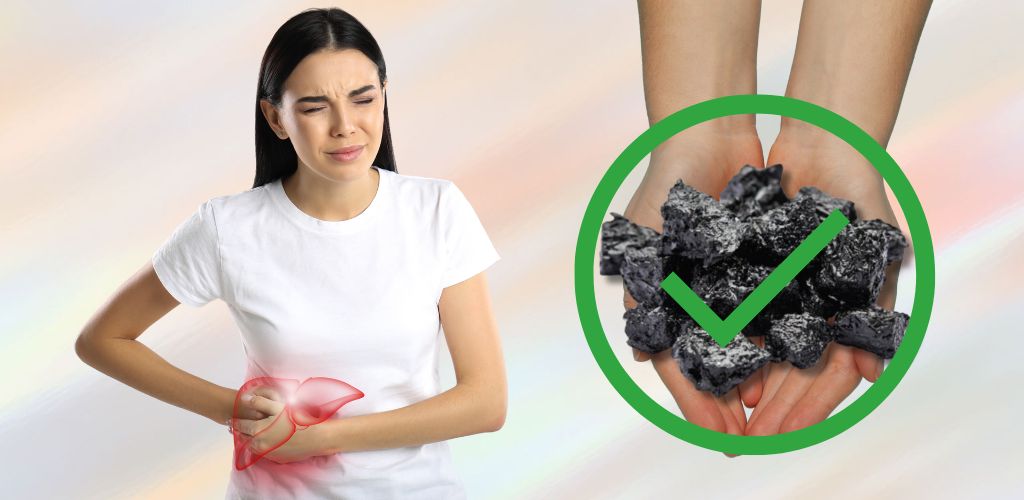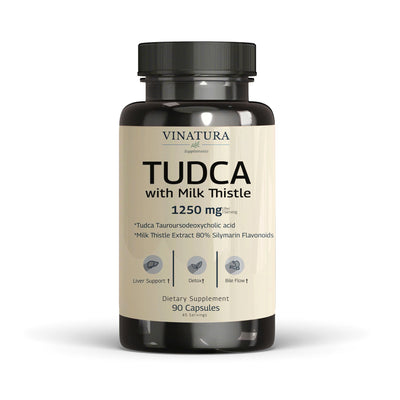
Does Shilajit Affect the Liver? Helpful Or Harmful?
The liver is essential for detoxifying our bodies, removing toxins, aiding digestion, and maintaining overall health. Conditions such as fatty liver and hepatitis can disrupt its function.
As a natural substance that's gotten much attention lately, Shilajit provides many potential health benefits.
So, here's the big question: "Does shilajit support or harm liver health?" That's what I am going to talk about in this blog post: Does Shilajit Affect Liver?
Before exploring further, please read the disclaimer located at the end of this webpage.
Does Shilajit Affect the Liver? Helpful or Harmful?
The liver is the biggest organ in our bodies and does a lot to keep us healthy. It works non-stop to break down drugs and food, and it filters about 35 liters of blood every day!
If your liver isn't working well, your health might suffer. But the liver is fantastic because it's the only organ that can grow back. Even if only 25% remains, it can grow into a whole new liver.
Did you know?
- High-quality Shilajit has shown promise in both preventing and treating conditions like fatty liver and hepatitis.
- Shilajit has been shown to help our body tissues grow back much faster than usual, so it's wise to include it in any plan to help your liver heal.
- Shilajit has been used in Ayurvedic medicine for ages to treat different conditions, including liver problems.
- Shilajit contains unique compounds with antioxidant and anti-inflammatory properties that can reduce inflammation, enhance liver function, and promote health.
So, using shilajit might be a good idea for your liver health. But always talk to your doctors first and only use it if they recommend it.
Is Shilajit Good for Fatty Liver?

Fatty liver is a condition where extra fat builds up in the liver, even without alcohol consumption. It's often linked to lifestyle factors like insulin resistance, obesity, high cholesterol, and metabolic syndrome.
From simple fat buildup to more severe liver damage and inflammation, known as non-alcoholic steatohepatitis (NASH), different levels of severity can occur.
Shilajit is suitable for managing high cholesterol and also helps treat fatty liver. It has stuff like fulvic acid and antioxidants that protect the liver from harm caused by bad stuff in the body.
Shilajit helps clean out the liver by getting rid of harmful things, which makes the liver work better overall. Shilajit also reduces swelling in the liver, which is important for avoiding liver issues like fatty liver or cirrhosis.
Plus, shilajit helps the liver cells grow back, fixing any damage that's already happened. If you use shilajit to stay healthy, you might keep your liver in good shape and lower the chances of having fatty liver.
Learn more: Is Shilajit Bad for Kidneys? How to Kidney Patients Take Shilajit
How Is Shilajit Good for the Liver?
Shilajit is a natural substance from rocks in high places like the Himalayas mountains.
It's like a resin packed with minerals, fulvic acid, and other good vitamins. People are interested in Shilajit because it can boost energy, improve immunity, and help different parts of our body work better.
Looking into how shilajit affects the liver:
Support Detoxification
One of the liver's primary tasks is to assist the body in detoxification. Fulvic acid found in Shilajit has been linked to antioxidant and detoxifying properties. These attributes aid the liver in effectively removing toxins and harmful chemicals from the body. [1]
Inflammation Property
Liver diseases often lead to inflammation as a response to injury. Shilajit's anti-inflammatory properties can help reduce stress on the liver, potentially easing inflammation associated with liver conditions. [2]
Antioxidant Property
Liver diseases can lead to oxidative stress, which harms cells. Shilajit's antioxidant properties may help alleviate oxidative stress, enhancing the liver's ability to heal and regenerate.[3]
Balanced Metabolism
Shilajit's influence on metabolism might indirectly enhance liver function. A well-functioning metabolism can aid in handling conditions such as fatty liver disease and prevent the accumulation of excess body fat. [4]
Are There Any Side Effects of Shilajit for the Liver That You Should Be Aware of?
While the potential benefits of shilajit for liver health are attractive, it's crucial to be cautious, especially for those with existing liver issues.
Before adding shilajit to your routine, it's essential to consult with a healthcare provider. Shilajit may or may not be suitable depending on the specific condition and individual health considerations, as liver diseases vary.
Precautions:
- Impurities: If not properly purified, Shilajit may contain heavy metals like lead, mercury, and arsenic. [5] It's best to use a purified and safe preparation of shilajit for consumption.
- Compatibility: Shilajit should not be consumed with certain foods like pigeon meat, horse gram, and black nightshade. [6]
- Pregnancy and Breastfeeding: Even though shilajit has been used in Ayurvedic medicine for a long time, it is usually considered safe. But there hasn't been enough research done about whether it's safe for pregnant or breastfeeding women.
- Children and Elderly: It's advisable to avoid giving shilajit to small children and older adults due to limited information regarding its safety for these age groups.
Learn more: Types Of Shilajit: Shilajit Powder Vs Resin Or Capsules?
Conclusion
Shilajit is interesting because it might benefit liver health by supporting detoxification, reducing inflammation, providing antioxidants, and helping with metabolism.
However, seeing Shilajit as part of a larger plan for liver health rather than a standalone solution is essential.
While Shilajit has potential, it's not a substitute for expert medical advice or treatments, especially since liver diseases are complex.
It's best to include Shilajit in your health routine under the guidance of a healthcare professional, ensuring it's beneficial for your liver and overall well-being.
Remember that Shilajit, like other natural remedies, isn't a cure-all.
References
- [1] Wilson E., Rajamanickam G. V., Dubey G. P., et al. Review on shilajit used in traditional Indian medicine. Journal of Ethnopharmacology. 2011;136(1):1–9. https://sci-hub.se/10.1016/j.jep.2011.04.033
- [2] Junek R., Morrow R., Schoenherr J. I., et al. Bimodal effect of humic acids on the LPS-induced TNF-α release from differentiated U937 cells. Phytomedicine. 2009;16(5):470–476. https://sci-hub.se/10.1016/j.phymed.2008.10.003
- [3] Dotan Y., Lichtenberg D., Pinchuk I. Lipid peroxidation cannot be used as a universal criterion of oxidative stress. Progress in Lipid Research. 2004;43(3):200–227. https://sci-hub.se/10.1016/j.plipres.2003.10.001
- [4] Carrasco-Gallardo et al., 2012b C. Carrasco-Gallardo, L. Guzmán, R.B. Maccioni Shilajit: a natural phytocomplex with potential procognitive activity Int J Alzheimers Dis, 2012 (2012), pp. 1-4 https://sci-hub.se/10.1200/JCO.2002.20.3.776
- [5] Carrasco-Gallardo C, Guzmán L, Maccioni RB (2012) Shilajit: a natural phytocomplex with potential procognitive activity. Int J Alzheimers Dis 2012:674142. https://doi.org/10.1155/2012/674142
Author

Product Disclaimer
Including an ingredient or study does not evaluate, endorse, or recommend any Vinatura product or any third-party product. Some ingredients discussed may not be used in any Vinatura product.
The content of the articles has not been evaluated by the Food and Drug Administration (FDA) and is not intended to promote or endorse any specific product. Any products sold on this website are not intended to diagnose, treat, cure, or prevent any disease.
Opinions and Endorsements
Any claims, statements, or opinions expressed in the articles are those of the author(s) and do not necessarily reflect the views or opinions of the manufacturers of the dietary supplement products. The products sold on this website are separate from the content of the articles and are not directly endorsed or associated with the information presented here.
Liability Disclaimer
The author(s) of the articles, website, and manufacturers of the dietary supplement products do not assume any liability for any potential consequences arising from the use of the information provided in the articles. Ingredient effects, dosages, and safety vary by individual, formulation, and context; some ingredients interact with medications or may be unsuitable during pregnancy or lactation. It is recommended that individuals consult with a qualified healthcare professional before making any dietary or lifestyle changes, including the use of dietary supplements.
Product Usage
Please refer to the product labels and packaging for specific usage instructions and guidelines for the dietary supplement products sold on this website.
Customer Support
For any concerns or questions regarding the dietary supplement products, please contact our customer support team, who will be more than happy to assist you.






Leave a Comment
Be the first to comment.
What do you think?